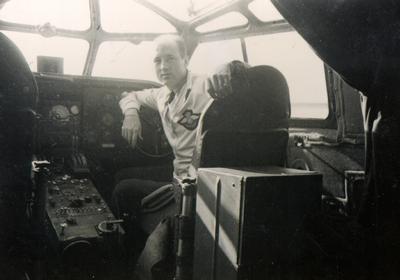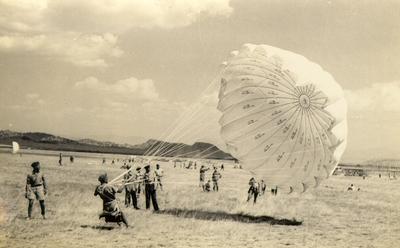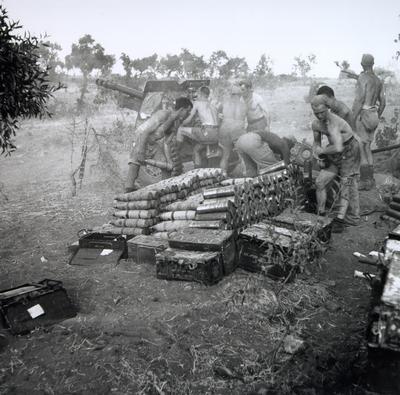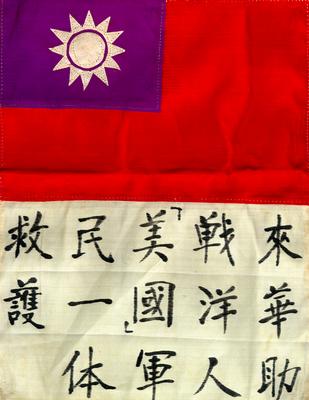
Oakville at War
Fighting
Panels
IntroductionFirst World WarSecond World WarFurther ResearchVeterans Interviews (click on Details to play video)What was it like to fight in the war? The following excerpts from letters, documents, and news reports give brief but valuable glimpses into the experiences of three servicemen.
Ted Hillmer, a flight sergeant, wrote in a letter, “There is nothing more fascinating to us than to, in the middle of the night, crawl out to our aircraft and set out for enemy territory. Then when we get over our target, you can bet they don’t greet us with bouquets of flowers. In fact they toss everything up but the bath tubs. It looks just like a huge fireworks display of every colour of flack bursting so close to you that sometimes you feel like saying good morning to St. Peter. Nevertheless, so far my trips have been successful. That is I have returned from them all. …” Ted Hillmer was killed in action after his plane went down in the North Sea soon after writing this letter.
Herbert E. Heath, taken prisoner of war at Dieppe, later recounted his experiences to the Oakville Lions Club. Making light of his difficult time where one pint of soup and a loaf of bread had to feed nine men, he described the Germans’ attempts to keep the Canadians shackled. The Oakville Record Star reported his story: “The first day their hands were tied behind their backs with the cord from Red Cross parcels. One of the men managed to cut his bonds on a tin can and soon all were free. … The [Germans] were a bit ruffled when they found them ... The next day their hands were bound in front but this merely simplified the matter of freeing themselves. A week later chains and padlocks were tried but one of the men fashioned a key from a sardine can opener and fifteen minutes later he was unshackled and soon released the remainder. The [Germans] …then devised a super handcuff but the same genius who had manufactured keys for the previous locks soon solved the latest ones. When the guards arrived to remove them the men were walking nonchalantly about their quarters and directed the embarrassed [Germans] to a heap of shackles lying on a bed. The game went on for 13 months when the idea was abandoned ….”
John MacMorran Anderson, a chaplain, received two Military Crosses for courage and initiative. The Military Cross Award describes his bravery at Buron, France in 1944: “Captain Anderson directed the evacuation of the wounded from the front to the unit regimental aid post. He personally drove a jeep through the most intense mortar fire, shelling, and machine-gun fire. He moved right up to the forward troops in the midst of the battle and carried wounded men back. Without his calm and steadfast gallantry, the wounded could not have got back and his cheerful courage was an inspiration to all ranks. He saved the lives of many men by repeated trips throughout heavy fire.”
Ted Hillmer, a flight sergeant, wrote in a letter, “There is nothing more fascinating to us than to, in the middle of the night, crawl out to our aircraft and set out for enemy territory. Then when we get over our target, you can bet they don’t greet us with bouquets of flowers. In fact they toss everything up but the bath tubs. It looks just like a huge fireworks display of every colour of flack bursting so close to you that sometimes you feel like saying good morning to St. Peter. Nevertheless, so far my trips have been successful. That is I have returned from them all. …” Ted Hillmer was killed in action after his plane went down in the North Sea soon after writing this letter.
Herbert E. Heath, taken prisoner of war at Dieppe, later recounted his experiences to the Oakville Lions Club. Making light of his difficult time where one pint of soup and a loaf of bread had to feed nine men, he described the Germans’ attempts to keep the Canadians shackled. The Oakville Record Star reported his story: “The first day their hands were tied behind their backs with the cord from Red Cross parcels. One of the men managed to cut his bonds on a tin can and soon all were free. … The [Germans] were a bit ruffled when they found them ... The next day their hands were bound in front but this merely simplified the matter of freeing themselves. A week later chains and padlocks were tried but one of the men fashioned a key from a sardine can opener and fifteen minutes later he was unshackled and soon released the remainder. The [Germans] …then devised a super handcuff but the same genius who had manufactured keys for the previous locks soon solved the latest ones. When the guards arrived to remove them the men were walking nonchalantly about their quarters and directed the embarrassed [Germans] to a heap of shackles lying on a bed. The game went on for 13 months when the idea was abandoned ….”
John MacMorran Anderson, a chaplain, received two Military Crosses for courage and initiative. The Military Cross Award describes his bravery at Buron, France in 1944: “Captain Anderson directed the evacuation of the wounded from the front to the unit regimental aid post. He personally drove a jeep through the most intense mortar fire, shelling, and machine-gun fire. He moved right up to the forward troops in the midst of the battle and carried wounded men back. Without his calm and steadfast gallantry, the wounded could not have got back and his cheerful courage was an inspiration to all ranks. He saved the lives of many men by repeated trips throughout heavy fire.”

Not all servicemen went overseas to fight. Many remained in Canada performing important tasks needed to win the war. Jack Wyndham was posted to Boucherville, QC as a radio navigator for the RAF Ferry Command. He is shown inside a flying boat in 1942. Details

Members of the "Devil's Brigade" training for paratrooping and sabotage missions behind enemy lines. Oakville's William Cutmore served with them and was killed in action in 1944 on the brigade’s last mission. Details

Men of the Royal Canadian Artillery fire a 25-pounder at enemy positions in Nissoria during the invasion of Sicily in 1943. Gunner Jim Gibb from Oakville is centre right of the gun. Details

Cloth flags such as this were issued to airforce pilots fighting the war against Japan. If a pilot was forced to leave his plane, and did not know the local language, the flag's message asked for assistance on his behalf. Details
